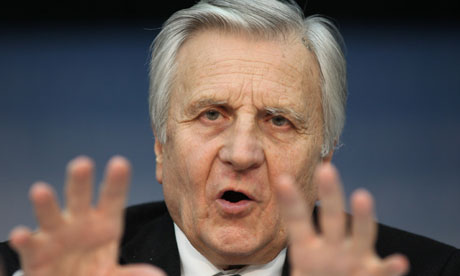
European Central Bank president says threat of market collapse in the eurozone is the 'worst since the second world war'
The president of the European Central Bank, Jean-Claude Trichet, vigorously defended his controversial decision to buy up Italian and Spanish bonds, saying the European debt crisis held the potential for the worst market collapse for almost a century.
"It is the worst crisis since the second world war and it could have been the worst crisis since the first world war if leaders hadn't taken the important decisions," Trichet said in an interview with the French radio station Europe1 on Tuesday.
As the borrowing costs of the latest countries to be caught up in Europe's debt crisis fell for a second day running, Trichet implicitly confirmed that the ECB was behind a surge in purchases. "We are in the secondary market," he acknowledged.
The rise in demand lifted the prices of Italian and Spanish bonds, cutting their yields which represent the return to investors and the cost to the governments issuing them.
The news from the debt markets, however, did little to prevent turmoil on Europe's stock markets which extended their earlier, heavy losses before climbing back in response to the positive opening on Wall Street. Sentiment was initially depressed by the release of data showing a slowdown in German export growth.
The Federal Statistical Office said exports in June were up by 3.1% to €88.3bn($126bn) on the year, the lowest increase in 16 months. Since the introduction of the euro, Germany's export-led economy has become even more crucial to European growth than it was before.
"In June we got to feel the first indications of the decreasing global economic dynamism," said Anton Börner, the head of Germany's exporters' association, who warned that the effect of a slowing US economy would "be felt in the coming months".
The Bank of France's monthly industrial survey showed both corporate order books and factory utilisation rates falling for the second month in a row in July.
A slowdown in growth in the eurozone's two core economies would only encourage speculation that they are next in line to be contaminated by the debt crisis.
Bloomberg reported that, for the first time in three years, the cost of insuring against a German default on its bonds had risen to more than was asked for insurance against a British default.
Trichet said: "In the past few days, we have asked the Italian government very clearly to take a certain number of decisions... and in particular to speed up the return to a situation of normal balance [between spending and revenue]."
He added: "The same thing has been asked of the Spanish government."
His remarks went some way towards confirming a report on Monday that he and his designated successor, the Italian central bank governor, Mario Draghi, had sent Italy's prime minister, Silvio Berlusconi, a detailed "shopping list" of reforms they wanted in exchange for supporting Italy's bonds.
On Friday, Berlusconi announced that he was bringing forward to 2013 the date by which he intended to eliminate Italy's budget deficit.
The ECB's reported intervention has ignited political controversy, with opposition leaders claiming Berlusconi has surrendered control to Frankfurt.
Antonio Di Pietro, head of the Italy of Principles party, claimed that the prime minister had been "dragged by the ear by the EU and international economic institutions" into making last week's announcement.
Further evidence that the crisis is pushing the eurozone towards centralised policy-making came from Germany's economy minister and vice-chancellor, Philipp Rösler. He proposed the creation of a new "stability council" that could penalise member states that lived beyond their means and oversee competitiveness tests, which could look at, among other things, the flexibility of labour markets.
With some analysts expressing scepticism about the long-term effectiveness of the ECB's bond-buying spree, the bank's president refused to say how long it planned to remain in the market.
"What we expect is that the governments do what we consider to be their job," Trichet said.
It was agreed last month that the ECB should hand over its debt-purchasing role to the eurozone governments' bailout vehicle.
The European Financial Stability Facility (EFSF) cannot start to intervene in the markets, however, until its terms of reference have been adjusted and its new powers ratified by eurozone parliaments, which are in recess.
By most estimates, the process can be finished by mid-October.
Continue reading - Jean-Claude Trichet defends buying bonds to halt European debt crisis
Reuters: ECB says will "actively implement" bond-buying
Telegraph: European Central Bank must go nuclear to save Europe
No comments:
Post a Comment